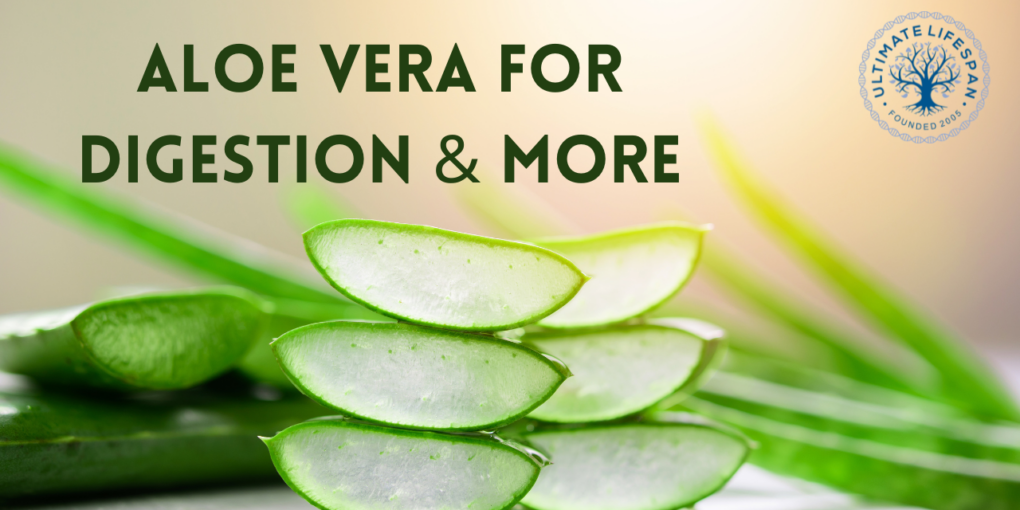Aloe Vera: The Ancient Healing Plant for Digestion and Beyond
The humble Aloe vera plant, often spotted in sunlit windowsills, is one of the oldest recorded medicinal plants in human history. Traced back over 6,000 years to ancient Egypt, where it was known as the “plant of immortality,” Aloe vera was cherished for its incredible health benefits. While it's widely recognized for its skin-soothing properties, especially in sunburn relief, the magic of Aloe vera goes far beyond skincare. This East African native is a powerhouse for digestive health and offers a myriad of other wellness benefits.
Digestive Health
When it comes to digestive health, Aloe vera is nothing short of miraculous. The gel inside its succulent leaves is packed with nutrients that soothe and heal the gastrointestinal tract. Whether you're dealing with a sluggish digestive system or more chronic issues like irritable bowel syndrome (IBS), Aloe vera can provide significant relief.
1. GI Inflammation
Aloe vera’s anti-inflammatory properties are well-documented. When ingested, it acts as a natural soother for the entire digestive system, calming inflamed tissues from the esophagus down to the colon. This makes it particularly beneficial for those with conditions like gastritis or colitis, where inflammation is a major concern. The plant’s mucilaginous gel forms a protective layer over the lining of the GI tract, helping to reduce irritation and promote healing.
2. Leaky Gut
Leaky gut syndrome, where the lining of the intestine becomes overly permeable, allows toxins and partially digested food particles to escape into the bloodstream. This can lead to widespread inflammation, food sensitivities, and even autoimmune conditions. Aloe vera can help restore the integrity of the gut lining thanks to its high polysaccharide content, which supports cell repair and regeneration. Regular consumption of Aloe vera gel can assist in sealing those gaps, reducing symptoms, and improving overall gut health.
3. Constipation
For those struggling with constipation, Aloe vera offers a natural solution. The latex found just beneath the skin of the Aloe vera leaf contains compounds known as anthraquinones, which have strong laxative effects. These compounds increase intestinal water content, stimulate mucus secretion, and boost peristalsis (the muscle contractions that move food through the digestive tract). However, it's important to note that the latex can be quite potent and should be used sparingly to avoid cramping or diarrhea.
4. Detoxification
Aloe vera is also a powerful detoxifier. It aids in the elimination of toxins from the digestive system, particularly in the liver and kidneys, which are key organs for detoxification. The plant's high fiber content helps to bind and remove waste products from the body, promoting regular bowel movements and preventing the buildup of harmful substances. This detoxifying action supports digestion and contributes to overall health and vitality.
5. Gut Bacteria
Maintaining a healthy balance of gut bacteria is crucial for optimal digestion and overall health. Aloe vera has prebiotic properties, meaning it provides nourishment for beneficial gut bacteria like Lactobacillus and Bifidobacteria. By supporting these friendly microbes, Aloe vera helps to crowd out harmful bacteria and yeast, reducing the risk of infections and promoting a balanced gut microbiome.
6. Heartburn
Heartburn, a common complaint for many, is often caused by acid reflux. Aloe vera can provide soothing relief by reducing inflammation in the esophagus and stomach lining. Additionally, its alkaline nature helps to balance stomach acidity, which can prevent the burning sensation associated with heartburn. Aloe vera’s gel also coats the esophagus, providing a protective barrier that can help prevent further irritation from stomach acid.
Beyond Digestion: Other Health Benefits of Aloe Vera
While Aloe vera’s digestive benefits are impressive, this versatile plant offers much more:
1. Rich in Nutrients
Aloe vera is a nutrient powerhouse. It contains a wide range of vitamins, including vitamins A, C, E, and several B vitamins. It's also rich in minerals like calcium, magnesium, zinc, and amino acids, the building blocks of proteins. These nutrients not only support digestive health but also contribute to overall wellness, boosting the immune system, enhancing skin health, and even supporting mental clarity.
2. Skin Health
Beyond its internal benefits, Aloe vera is famous for its skin-healing properties. Applied topically, it can accelerate wound healing, soothe burns, and reduce skin inflammation. Its hydrating properties make it an excellent moisturizer, and its antibacterial effects can help manage acne and other skin conditions.
3. Weight Management
Aloe vera can also be a valuable ally in weight management thanks to its high fiber content. Fiber helps to create a feeling of fullness, reducing the likelihood of overeating. Moreover, by promoting regular bowel movements and detoxification, Aloe vera supports the body in maintaining a healthy weight.
4. Immune System
The polysaccharides in Aloe vera not only benefit the gut but also have immune-boosting properties. They help stimulate the production of white blood cells, which are critical for defending the body against infections. Regular consumption of Aloe vera can support the immune system, helping the body fend off illnesses more effectively.
Growing Your Own Aloe Vera
One of the greatest advantages of Aloe vera is how easy it is to grow at home. Aloe vera thrives with minimal care, whether you have a spacious garden or just a small sunny spot in your kitchen. This means you can have a fresh, natural remedy at your fingertips anytime you need it. Simply snip off a leaf, extract the gel, and you have a powerful health booster ready to use.
Tips for Growing Aloe Vera:
- Place your Aloe vera in a sunny spot, ideally where it gets about six hours of sunlight a day.
- Water it sparingly—Aloe vera is drought-tolerant and prefers dry conditions.
- Use well-draining soil specifically for succulent plants to prevent root rot, which can occur if the plant sits in water.
Incorporating Aloe Vera Into Your Diet
If you’re ready to start enjoying the benefits of Aloe vera, incorporating it into your diet is simple. You can add the gel to smoothies, mix it into juices, or even take it as a supplement in capsule form. Just be sure to use the inner gel and avoid the latex unless you're specifically seeking its laxative effects.
Precautions and Considerations
While Aloe vera is generally safe for most people, there are a few things to keep in mind:
- Allergies: Some individuals may be allergic to Aloe vera, particularly when applied to the skin. It’s always a good idea to do a patch test first if you’re using it topically.
- Laxative Effects: Aloe vera’s laxative properties can be too strong for some people, especially in large amounts. If you experience diarrhea or cramping, reduce your intake or stop using it altogether.
- Quality Matters: Not all Aloe vera products are created equal. Look for organic, cold-pressed, and 100% pure Aloe vera juice or gel to ensure you’re getting the full benefits.
Conclusion
Aloe vera is more than just a skin remedy; it's a comprehensive health tonic that supports digestion, boosts immunity, and promotes overall well-being. With its rich history and proven benefits, this ancient plant remains a valuable tool for modern wellness. Whether you grow it yourself or use it as part of a health supplement, Aloe vera is a natural ally worth having in your health arsenal.
With Aloe vera, you’re not just nurturing your digestive health—you’re embracing a holistic approach to wellness that has stood the test of time.
Sources
Abid Aslam Maan,Akmal Nazir, Muhammad Kashif Iqbal Khan, Tahir Ahmad, Rabia Zia, Misbah Murid, Muhammad Abrar. The therapeutic properties and applications of Aloe vera: A review. Journal of Herbal Medicine, Volume 12, June 2018.
Marta Sánchez, Elena González-Burgos, Irene Iglesias, and M. Pilar Gómez-Serranillos. Pharmacological Update Properties of Aloe Vera and its Major Active Constituents. Molecules, 2020.


